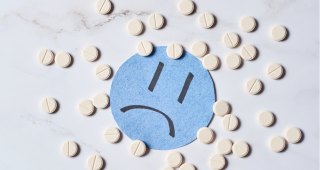SSRIs
Antidepressants Get a Bad Rap. Why Do So Many Take Them?
Antidepressants are often the subject of harsh criticism in the popular press.
Posted March 6, 2023 Reviewed by Tyler Woods
Key points
- The safety and efficacy of antidepressants are regularly questioned in the media.
- Antidepressants are nonetheless an effective treatment for many people.
- There are some therapies that might be more effective than antidepressants, but they can be more difficult to access.
- Journalists should present a more balanced view of the benefits and drawbacks of taking antidepressants.
According to a 2020 report from the Center for Disease Control and Prevention (CDC), between 2015 and 2018, 13.2 percent of adults aged 18 and over had taken an antidepressant medication in the last 30 days. It is almost certain that the next CDC report about antidepressant medication use will show that percent holding or even increasing. Millions of Americans take antidepressants to treat depression, anxiety disorders, chronic pain, and other conditions.
Yet it seems not a week goes by without a report, often transformed into print and social media headlines, that calls into question the safety and effectiveness of antidepressants, particularly the two most often prescribed classes, which are called selective serotonin reuptake inhibitors (SSRIs) and serotonin and norepinephrine reuptake inhibitors (SNRIs). Examples of the former are brand name drugs Prozac, Lexapro, and Zoloft and of the latter are brand name drugs Effexor and Cymbalta.
Two recent reports are examples of the kind of studies that seem to call into question whether antidepressants work or are safe to take. In terms of effectiveness, a review of reviews of the literature published in the journal BMJ earlier this year examined whether antidepressant medications work for pain. The review noted that, in many countries, including the U.S. and U.K., “chronic pain was the most common condition leading to an antidepressant prescription—even more so than for depression.” Despite this high rate of antidepressant prescription, the review found limited evidence that the medications actually work for chronic pain. “No review reported high certainty evidence about the effects of antidepressants for pain,” wrote the authors. Similar claims have been made that antidepressant medications offer only very small benefits in the treatment of depression and have significant adverse side effects.
Although this review of systematic reviews of the literature did not find a strong signal that antidepressants work for pain, it did find that, “Moderate certainty evidence supported the efficacy of SNRIs, mostly duloxetine [Cymbalta]…for back pain, postoperative pain, fibromyalgia, and neuropathic pain.” Hence, it remains the case that for some people with chronic pain, some antidepressant medications may be helpful. That is also the case for some people suffering with depression and anxiety disorders.
Do Antidepressants Induce Bacterial Antibiotic Resistance?
In terms of safety, a surprising study published last year found that some commonly prescribed antidepressants (brand names Prozac, Cymbalta, Zoloft, and Wellbutrin) actually promoted bacterial resistance to antibiotics. The mechanism for this effect is complex, but the paper reporting it attracted a good bit of attention.
It is important to note that this was a laboratory study and therefore how it translates into the likelihood that people taking antidepressants could develop antibiotic-resistant bacterial infections is not yet known. In a commentary on the research that appeared in the journal Nature in January, Liam Drew noted that the lead author of the antidepressant antibiotic resistance paper warned against stopping antidepressants because of this research. Nevertheless, antibiotic resistance is a serious medical problem, and the study raises an important worry about long-term antidepressant administration.

These are but two examples of what seems like a constant barrage of studies and media reports warning us about antidepressants. Even the newest antidepressants, like ketamine, seem to be the subject of such cautionary tales. In February a piece appeared in the New York Times titled “I tried ketamine to treat my depression. It was terrifying.” In the article, a 65-year-old person with a history of chronic depression reported frightening adverse experiences with ketamine treatment. In dramatic terms, the author wrote:
"According to the psychiatrist’s notes I asked out loud, 'Am I okay?' (In my head I recall shouting something more like, 'GET ME OUT OF HERE!')…I soon felt completely immobilized, trapped in my body. I saw myself in a glass coffin looking out into the dark universe, although I’d see flashes of deeply hued magenta and chartreuse from time to time."
This is, of course, just one person’s experience and the New York Times has not, to our knowledge, published many perspective articles written by people who have had positive experiences with ketamine treatment. It highlights the fact that negative reports about antidepressant medications seem to capture media attention. SSRIs, SNRIs, ketamine, and other antidepressants are approved medications by the U.S. Food and Drug Administration (FDA) and have undergone extensive testing in many randomized controlled trials. These studies generally show that the drugs are more effective than placebos and well-tolerated by most people who take them. Yet they seem under constant attack.
Why Are Antidepressants So Often Put to the Test?
Why do we see such frequent doubts about the safety and efficacy of antidepressants medications? There are likely multiple reasons for this. Antidepressant medications don’t work for everyone. About one-third of people who take antidepressants do not have an adequate response to them, a situation called "treatment-resistant depression." That means there are lots of people out there who have personal experience with the drugs not working. With so many people taking antidepressants, it is natural that they will attract the attention of researchers trying to evaluate if there are any heretofore undiscovered dangers to them or if they don’t really work as well as pharmaceutical company marketing says they do.
There is also the issue of whether antidepressants are the best treatment for depression and anxiety disorders in the first place. A recent meta-analysis that included 409 trials with 52,702 patients once again showed that cognitive behavioral therapy (CBT) is at least as effective in treating depression as antidepressant medication, and in some analyses even more effective. In raising issues about how well medications work and if they are safe, it is often overlooked that for many patients with psychiatric illnesses they are not the best first-choice treatment. Evidence-based psychotherapies are effective and obviously have fewer physical adverse side effects compared to antidepressant medication. For a variety of reasons, however, it is often difficult for people to get those psychotherapies, including a shortage of qualified therapists and lack of insurance coverage. Furthermore, many people with depression and anxiety disorders are treated by primary care physicians—one study recently found that almost 16 percent of primary care visits address mental health concerns—and they cannot provide these kinds of therapies so revert to pharmaceutical treatment.
Antidepressant medications take many hits, both from scientists and in the media. Despite that, they continue to be used by millions of people, many of whom benefit. For the most part, these medications can be safely administered despite adverse side effects. We should remember that they are not the only way to treat depression, anxiety, and chronic pain—for many people, evidence-based psychotherapies are a better choice. While people who need them should not be afraid to take antidepressants under the close supervision of a physician or other qualified prescriber, their use appears to be a delicate balance between acknowledging the many studies that have shown their efficacy and safety on the one hand and the constant parade of studies and reports calling them into question.




